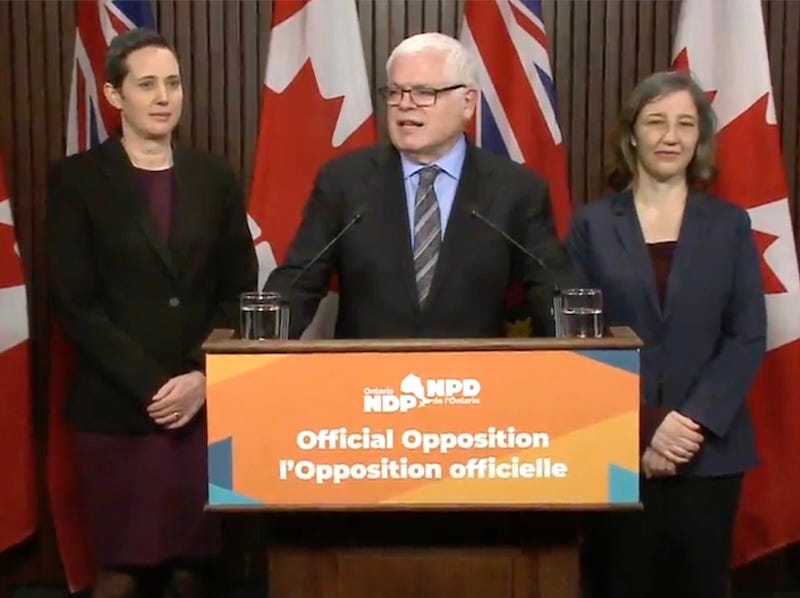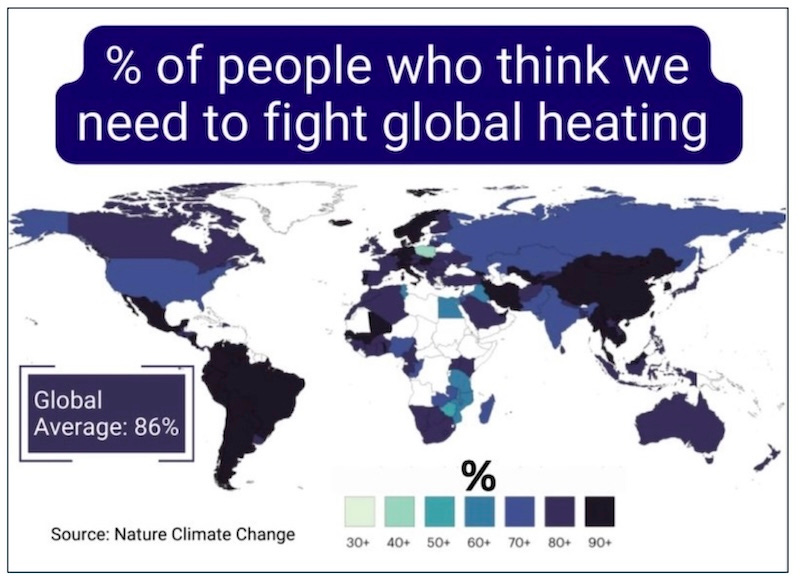The Performative Art of Climate Politics
Ontario’s Affordable Energy Act is a great idea. But it’s a private member’s bill in a hyper-partisan legislature. To really address climate and affordability, its backers may need something more.
By all appearances, a trio of opposition MPPs in Ontario had a good day in the Queen’s Park media studio Thursday morning. The question is whether the keyword in that sentence is “good” or “appearances”.
The NDP’s Peter Tabuns (Toronto-Danforth), Jessica Bell (University-Rosedale), and Chandra Pasma (Ottawa West-Nepean) held a 10-minute news conference, probably the shortest I’ve ever covered, to introduce Bill 172, the Affordable Energy Act. They’re co-sponsoring the private member’s bill along with New Democratic MPP Doly Begum (Scarborough Southwest).
“Electricity and gas have become unaffordable for many Ontarians, especially those with low or fixed incomes,” but “Ontario’s current government has responded by providing subsidies and increasing the use of natural gas for heating and power generation,” the bill states in its preamble. “The two most effective ways to stabilize energy bills and make energy affordable are increasing the use of distributed energy resources and supporting deep, full building, retrofits.”
Bill 172 would set up a new Crown agency, Affordable Energy Ontario, to open opportunities for all Ontarians “to benefit from distributed energy resources and to subscribe to or invest in offsite renewable energy generation and storage facilities owned by community energy organizations.” It would deliver deep energy retrofits to buildings across the province, with priority to social housing and low-income rentals, and ensure well-paid, union labour for any project the agency funds or facilitates.
The bill does a great job of linking energy savings and emissions reductions to the affordability crisis that is sweeping the province and the country. That puts it at the centre of the widening push to correctly make the case that climate action gives us something back in our day-to-day lives, rather than taking anything away. That emissions reductions and the energy transition are about opportunity and gain, not loss and pain.
It’s a good bill, and it should be. By name-checking renewable energy veterans Geoff Stiles and Roger Peters as advisors who helped with the drafting, Tabuns signalled that there was nearly a century of learning and hands-on experience behind the bill. [We’re proud to work with Peters as a member of the community sounding board for our weekly Heat & Power edition.]
But that doesn’t mean it’ll go anywhere in the real world of provincial politics in Ontario.
Winning the Argument, Losing the Decision
In their media briefing, the three MPPs made a powerful case for why Bill 172 is so urgently needed.
“Report after report shows that a focus on conservation and community-based distribution for renewable energy can substantially cut costs of providing energy and cut greenhouse gas emissions,” said Tabuns. “It’s time for the Ford government to get serious about Ontario’s energy future and focus on making sustainable, affordable, and reliable energy more accessible for Ontarians.”
“We have an affordability crisis and we have a climate crisis,” said Bell. “Too many Ontarians cannot afford to pay their bills, they cannot afford to pay their rent and mortgage, and they cannot afford to pay for food,” even as a “winter that felt like spring” and the worst wildfire season on record point to an alarming “new normal” in a warming climate.
Against these “warning signs,” an agency focused on home retrofits and distributed energy “is a win-win,” Bell added. “It has worked in other states and provinces, and it’s time to bring these innovative and practical solutions to Ontario.”
“We are already seeing the impacts of extreme weather, and Ottawa has really taken the brunt of that,” Pasma said, with multiple storms in recent years taking down parts of the local power grid for up to 10 days at a time. “These have a significant impact on community members, whether it’s seniors or people with disabilities, who are trapped in their own homes for days on end,” can’t heat or cook, and struggle to cover the cost after they have to throw out the food in their fridges and freezers.
Beyond the significant personal and financial toll, Pasma said it’s been “a matter of sheer luck” that each storm was followed by a period of temperate enough weather that people could live safely in their homes for days at a time without heat.
It was a powerful, compelling presentation. And this is a private member's bill in a Doug Ford government. With an overwhelming majority in the legislature, Ford and his team get to decide how the bill advances and whether it passes. It’s due to be presented at Queen’s Park April 10, but Tabuns acknowledges it hasn’t much of a hope.
“It is unlikely it will be adopted as the Conservatives are virtually always opposed to investment in conservation and renewable power,” he told The Weekender. “Without their votes, there are not enough votes to win.”
So. Have we really reached the point where a badly-needed, well-crafted piece of legislation can be nothing more than a well-intentioned piece of performance art? I guess we’re about to find out.
‘Treat It Like a Damn Emergency’
Is there a standard for judging whether Bill 172 can deliver as promised, with the level of impact the climate and cost of living crises both demand? At first glance, it doesn’t fare badly against the markers for a province or country in emergency mode, laid out in the June, 2021 launch video for the Climate Emergency Unit. It says governments are taking climate change seriously when they:
• Spend what it takes to win;
• Create new economic institutions to get the job done;
• Shift from voluntary policies to mandatory measures;
• Tell the truth about the severity of the crisis and what it will take to win—in other words, “speak and act like it’s a damn emergency”;
• Deliver a jobs guarantee for everyone who wants one, with a fair, practical transition for anyone in a fossil fuel community or on the front lines of the climate crisis.
A private member’s bill can’t mandate spending, and there’s no language in the Affordable Energy Act that would make home retrofits or distributed energy compulsory: the emphasis is on opening the door, and there’s good evidence that when governments act on measures like home retrofits, citizens step up a lot faster and in much larger numbers than program designers seem to expect.
The bill does create a new provincial agency. It contains important language on good jobs, if not jobs for all. And its proponents are certainly speaking and trying to act like it’s a damn emergency.
The problem is that Bill 172 will face a legislature with an overwhelming majority of MPPs with a six-year history of hostility to emission reductions and the energy transition. In 2022, Team Ford took 83 of the 124 seats in the legislature with 40.8% of the popular vote, and just 17.76% of eligible voters.
Climate Emergency Unit Strategy Director Seth Klein never intended the reference to economic institutions to extend to our legislatures. While he’s on record supporting electoral reform, the institutions he had in mind in his 2020 book, A Good War: Mobilizing Canada for the Climate Emergency, were the 28 Crown corporations the federal government set up to accelerate Canada’s effort in the Second World War.
But by slightly misusing Klein’s focus on institutions and structures, we can see where Bill 172 runs aground. The habitual, perpetual vote split in Ontario between the NDP and the Liberals has been a live topic at the community level for many years, mostly among people who are far more partisan for climate action and solutions than they are for any of the political parties. But apparently, nobody in a position to do anything about it thinks it's a good idea for these particular two parties to work together until after the votes are counted and it's too late.
“I think you are suggesting that the parties could declare common cause and have a pre-election coalition,” one of the bill’s supporters said in an email. “I see no practical way for that to happen. I can easily see cooperation between parties after an election to get items through the house as is currently happening with the Liberal-NDP agreement federally.”
But only if the two parties combined can win enough seats to make it happen. How’s that working for them so far?
How a Private Member’s Bill Can Deliver
Any private member’s bill is a long shot, but there are times and places when they have a chance to make a difference. At the federal level, MP Laurel Collins (NDP-Victoria) tabled a bill last month to ban thermal coal exports. And The Weekender heaped accolades on MP Charlie Angus (NDP-Timmins-James Bay) for his bill to ban fossil fuel advertising.
What Bill 172 has in common with the Collins and Angus measures is the ability to boost organizing efforts and help mobilize public opinion. The difference is the entrenched, dysfunctional political dynamic in Ontario where the NDP and Liberals keep bashing away at each other, Ford keeps smiling, the Greenbelt faces continuing threats, the political boondoggles keep rolling, the gas plants keep emitting, and only recently has the renewable energy industry finally, belatedly, stopped being consistently throttled. Without tackling that deeper structural problem, you have to wonder whether a private member’s bill is the right tool for the job.
The bill might work if its failure to thrive in this legislature became a flashpoint in the election that chooses the next one. That would only happen if the NDP elevated energy affordability as a priority campaign issue and used it to try and break the deadlock between the two opposition parties that has enabled Ford to deliver two terms’ worth of climate calamities after too many ridings split the vote. (For that matter, the Liberals could try it, too, if they wanted to.)
For that to happen, election strategists for at least one of the parties would have to choose energy affordability as one of the two or three priority issues for their new leaders and their local candidates to hammer away at every day during the campaign. Not because it outweighs all the other forms of social and economic wreckage the current government has brought to Ontarians’ doorsteps, but because affordable energy helps solve those problems, too.
If you tilt your head and shield your eyes, you can just barely see how it might work. But there’s another option that I’ve heard from dozens of colleagues and friends over the years, people who are very much inside the general political “bubble” but mostly outside the partisan spheres of any political party.
If we really mean it that climate change, or affordability, or nature protection, or all of the above, are generational crises that transcend political partisanship, why not coordinate efforts in selected ridings to stop splitting the vote? Why not take the cue from 59.2% of the province’s voters, and up to 82% of those eligible to vote, and help them get their voices back?
Time to Choose
In principle, if not in practice, Bill 172 creates a moment of decision and opportunity for MPPs of all political stripes.
If anyone knows of a way to get all four parties in the legislature onboard with the rapid energy affordability and emissions reductions we need, or even to build a functioning majority of MPPs to get this bill passed…party preferences be damned, and let’s get on with it.
But failing that, if what we’re really seeing is that the people we elect to serve our best interests don’t have the tools to do the job, in a climate emergency or a cost of living emergency, they need to do us the courtesy of saying it out loud.
If MPPs of all persuasions don’t see these intersecting crises and their visible, front-line impacts in their own communities as an urgent enough reason to try something new and multi-partisan, after nearly 60% of the popular vote in 2022 told them they probably should…they need to admit that party loyalty still defeats action and results.
But they should recognize that we’re well past the point where any of us have time to be led on with false hope. The NDP news conference took place just a day after the European Union’s Copernicus climate lab reported that the Earth and its oceans obliterated global heat records for the ninth month in a row. Elsewhere, we learn that the number of Ontarians relying on food banks increased 41% from 2019 to 2023. And this month, the average cost of a one-bedroom apartment hit $2,495 in Toronto, $2,294 in Mississauga, $2,255 in Etobicoke, and $2,037 in Ottawa.
One of my takeaways from the last few years is that if there’s anything we can imagine doing to make a tangible difference on climate change, it can’t wait. Whatever the idea, if we aren’t already doing it, we have a duty to get on with it—even if it’s difficult, even a bit scary, or takes our work in directions we never imagined it would go.
The four MPPs in Ontario have come up with a solid solution that isn’t scary, and shouldn’t be difficult, except that the province’s politics make it so. That’s a problem they have the power to solve, and it may turn out that everything else they want to do depends on it.
Mitchell Beer traces his background in renewable energy and energy efficiency back to 1977, in climate change to 1997. Now he and the rest of the Energy Mix team scan 1,200 news headlines a week to pull together The Energy Mix, The Energy Mix Weekender, and our weekly feature digests, Cities & Communities and Heat & Power.
Map of the Week
Program In Chaos, Layoffs Have Started as Advocates Urge Wilkinson to Restore Greener Homes Grants
‘Blue’ Hydrogen Could Produce 50% More Warming than Burning Fossil Fuels
Canadians ‘Profoundly Worried’ about Wildfires as Texas Panhandle Burns
‘Banana Republic’ Alberta Risks Losing Its Lead in Renewable Energy Development
‘Unprecedented’ Bill to Overrule Ontario Gas Regulator Alarms Experts
Building 5.8M Net-Zero Homes by 2030 Requires Politicians to Get Along, Task Force Concludes
Trans Mountain Price Tag Jumps to $34B as Market Prospects Dim
Biden’s LNG Pause Won’t Create Demand for Canadian Exports: IEEFA
‘Substantial Damage’, No Injuries as Freight Train Hits Wind Turbine Blade
Canadian oil producer Cenovus Energy plans to boost production 19% in next five years (Reuters)
Athabasca Chipewyan First Nation suing Alberta Energy Regulator over tailings leak (Globe and Mail)
First Nation in northern Alberta signs oilsands lease development MOU with Suncor (The Canadian Press)
Ring of Fire infrastructure agreements reached, but some First Nations voice concerns (Queen’s Park Briefing)
As drought persists on the Prairies, some farmers are selling off their herds (Canadian Broadcasting Corporation)
Alberta outlines $125M drought and flood grant program as water-sharing talks continue (Canadian Broadcasting Corporation)
Inaccurate government data may be stoking wildfires: UBC study (The Canadian Press)
The worst wildfire in Texas' history has a complex link with climate change (British Broadcasting Corporation)
Arctic could see first ‘ice-free’ day within years, scientists warn (The Independent)
World on brink of fourth mass coral reef bleaching event, NOAA says (Reuters)
New policy proposal dims hopes of reviving community solar in California (Canary Media)
Tesla’s German plant to restart operations next week, works council head says (Reuters)









Dear Mitchell:
I read your Weekender with interest and a little disappointment. I understand that your take was to illustrate the politics of private members bills but in doing so you obscured the groundbreaking goal and contents of the Affordable Energy Act. Climate is not the main purpose of the bill. The goal is affordability - by getting serious about the deep retrofit supply chain and by giving all citizens the right to benefit from renewable energy - while at the same time proving good jobs, community benefits for all, and reduced emissions.
This is first time in Canada that a political party has taken a serious approach to building a deep retrofit supply chain, tenants retrofit rights, and supported the rights of all citizens to generate, store and share their own energy individually and through community ownership. For example the bill would support the development of fast modular retrofits, as well as community owned off site generation and subscription solar for low- and middle-income consumers. These are policies that Efficiency Canada, RE coops and local communities in Ontario and across Canada have been advocating for a long time - policies that have been in place in other countries in Europe, UK, NZ and the US for years.
Most fundamentally it puts policies supporting affordable clean energy and democratic community ownership of distributed energy resources on the map.
It's no doubt “appearances”. The McGuinty and Wynne liberals already tried the Ontariowende approach and by all accounts, failed spectacularly.